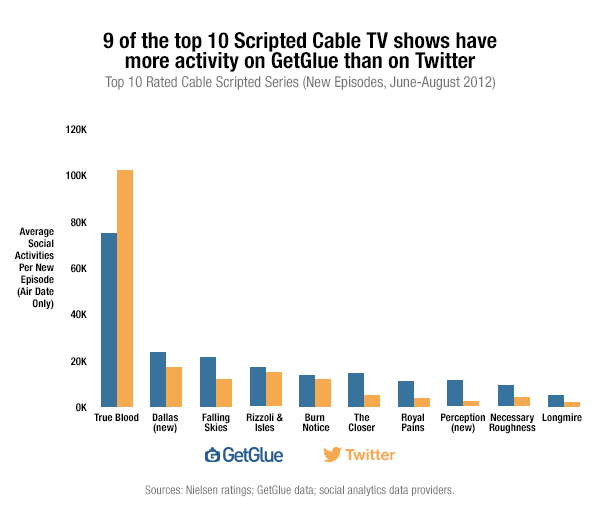What if Social TV Is Less Social Than We Think?
Most “social TV” apps want you to hang out with them instead of gabbing about TV on the social networks you’re already using, like Twitter. That seems like a nonstarter to me.
Not so, says one of them. GetGlue, a start-up that’s been working on social TV for a couple of years, says that for some kinds of shows it has as least as much engagement as Twitter does — even though Twitter has many more users.
GetGlue says that for many scripted TV shows — that is, excluding reality shows, news events, awards show or sports shows* — the company sees as much action, or more, than Twitter.
Here’s the argument (which requires many caveats, which you can read at the bottom of this post) in chart form:
Interesting. GetGlue CEO Alex Iskold would like you look at these graphs and conclude that his service, which he says has one million active users, is now competing on even ground with Twitter, which has 140 million users. (Twitter declined to comment.)
Perhaps! But you could also draw a different conclusion which doesn’t flatter either GetGlue or Twitter much: Perhaps there isn’t that much social TV chatter, period.
For instance, a new episode of “The Big Bang Theory” draws around 12 million viewers. But even if you use the most generous interpretation of GetGlue’s stats, the combined active GetGlue + Twitter social audience would be under 65,000 people — much less than 1 percent of CBS’s total. If you try the same math with HBO’s “True Blood,” the most social show on cable, the numbers might top 3 percent, but that one’s very much an outlier.
If you want to apply a positive spin to all this, you could argue that lots of people may be reading social TV tweets, even if they’re not writing them. And you could argue that even Twitter isn’t really a mainstream service yet, so we’re still in the very early days of social TV, and the numbers are going to go up.
But if they don’t, then the big pitch powering social TV — that people talking about shows online will generate bigger audiences offline — will be hard to sustain.
* These comparisons don’t hold up when you talk about big events, like the Oscars, or “Monday Night Football,” when there are a lot more people watching TV, and many more of them are likely to be tweeting than using a specialty service like GetGlue.
————-
About the data GetGlue is using here: Sorting through this stuff is not an exact science, and requires both guesswork and leaps of faith.
That’s because there isn’t any official measuring system that tracks “social TV” chatter. Instead there are competing services, like Trendrr, BlueFin and SocialGuide, all of which make their own guesstimates to track commentary on Twitter, Facebook, etc. It’s entirely possible that the tracking services overcount or undercount commentary on any given show.
And while services like GetGlue can track their own numbers, their stats don’t map precisely to other services, because you can do different stuff in different places. On GetGlue, for instance, you can “check in” to a show, and/or review it, and/or “like” it, etc. On Twitter, you could Tweet about a show, or retweet someone else’s comment, or “favorite” someone’s comment, etc.
Finally, the numbers that GetGlue is using here only tell us about the volume of chatter, not the total number of chatterers. But Iskold and his team think that the overwhelming majority of their interactions come from individual users, so, for argument’s sake, we’ll assume that’s the case.











